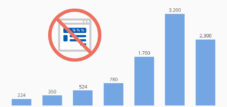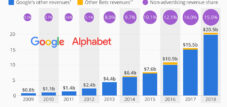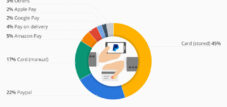Google paid more in EU fines than in taxes in 2018
Language selection 📢
Published on: February 12, 2019 / update from: April 23, 2025 - Author: Konrad Wolfenstein
EU money loss 2018: A precedent for the economy
Google's tax strategy and EU sanctions: a comprehensive analysis of the regulation of technology giants
The European Union has positioned itself in recent years as a decisive counterforce to the dominant technology groups from the USA. The year 2018 was particularly remarkable, in which Google-or more precisely his parent company Alphabet-had to spend more money on EU money than for tax payments worldwide. This imbalance illustrates the tensions between the profit -oriented tax optimization strategies of multinational corporations and the aim of the European Commission to ensure fair competitive conditions and adequate tax contributions. The record penalties against Google mark a turning point in the digital regulatory history and represent a precedent interference with the business practices of the technology giants, which brings far -reaching consequences for the entire industry.
The development of EU cartel procedures against technology giants
The beginnings of EU regulation in the technology sector
The history of the EU cartel procedure against technology companies did not even start with Google. At the beginning of the 21st century, Microsoft was targeted by European competitive keepers. The European Commission under the then competitive commissioner Neelie Kroes took a close look at the software giant because of its dominant position in relation to the Windows operating system and the Internet Explorer. In 2004, the Commission imposed a fine of 497 million euros against Microsoft and asked the company to offer a version of its operating system without the pre -installed media player.
These early disputes between the EU and Microsoft laid the foundation for the later, even more intensive regulation of technology groups. The EU Commission established itself as a leading regulatory authority in the field of digital economy long before other regions acted similarly. The success of these measures enabled the Commission to deepen their expertise in the assessment of complex digital business models and to develop a regulatory framework that could later be applied to other technology companies.
Google's growing problems with the EU cartel authority
With the increasing dominance of Google on the European market, the focus of the EU competition keepers was shifted. Under the leadership of Margrethe Vestager, who took over the office of EU competition commissioner in 2014, the Commission intensified its investigations against Google. The Danish politician quickly became known for her indomitable approach to regulating large technology companies and did not shy away from imposing unprecedented fines.
The first major punishment against Google took place in June 2017. The EU Commission imposed a fine of 2.4 billion euros due to behavior contrary to competitive behavior in connection with Google Shopping. The investigation had shown that Google systematically disadvantaged its own price comparison platform in the search results and systematically disadvantaged competing services. The Commission came to the conclusion that Google abused its dominant position in the area of internet search in order to get an illegal advantage in another market - for price comparison services.
But this was only the beginning of a series of punishments against the search engine giant. In July 2018, the fine ever imposed by the EU Commission followed: 4.3 billion euros for contrary practices in connection with the Android operating system. The Commission found that Google had imposed illegal restrictions on Android devices and mobile phone network operators in order to consolidate its dominant position. This included the obligation to install Google Search and the Chrome browser as well as restrictions on the development of alternative Android versions.
The record penalty of 2018 and their financial effects
The dimension of the Android penalty in comparison
The fine of 4.3 billion euros (about $ 5.1 billion) for Google's practices in connection with Android far exceeded every previously imposed competition penalty from the EU Commission. For comparison: The earlier record penalty against Intel from 2009 was 1.06 billion euros. The amount of the sanction imposed against Google not only reflected the severity of the violations found, but also the economic size and financial performance of the company.
It is particularly noteworthy that the fine for Google in 2018 was larger than the total income taxes that the company had to pay worldwide. This shows the discrepancy between the economic power of the group and its tax contributions. While Google generated billions of profits, the company was able to significantly reduce its tax burden through skillful international tax design - a phenomenon that can be observed not only on Google but many multinational technology companies.
Google's tax strategies and their criticism
Google's effective tax rate fell to a remarkably low 12 percent in 2018. This was partly due to the “Tax Cuts and Jobs Act” introduced by the Trump administration, which significantly lowered corporation tax in the USA. But even before this tax reform, Google had optimized its global control structure so that significant profits were booked in low -tax countries.
The Irish “Double Irish with a Dutch Sandwich” model was a preferred tax optimization process for Google and other technology companies for a long time. This complex system made it possible to transfer profits from Europe via Ireland and the Netherlands to the Bermudas, where there is no corporation tax. Although this practice was legal, it was increasingly criticized because it made it possible to minimize their tax burden in the countries in which they actually did business and generate profits.
Despite the enormous fine, Google was able to record $ 30.7 billion in 2018. This illustrates the immense profitability of the company and raises the question of whether even punishments in the billions of billions are sufficient to change the behavior of technology giants. For many critics, the fines, as high as they may appear, were only operating costs that the company could easily absorb without changing its basic business model.
The broader picture: EU versus technologies
The Apple case and the Irish tax payments
Google was not the only technology company that was targeted by the EU Commission. In August 2016, the Commission decided that Apple had to make 13 billion euros in tax payments to Ireland. The investigation showed that Ireland had granted the company inadmissible tax benefits over the years that violate EU subsidies. These tax benefits enabled Apple to pay an effective tax rate for its profits generated in Europe, which dropped from 1 percent in 2003 to 0.005 percent in 2014.
Ironically, the Irish government initially did not want to accept this additional payment and, together with Apple, made an appeal against the decision. This unusual step illustrates the complex economic and political interests that play a role in taxing multinational companies. Due to its low tax rates and advantageous tax regulations, Ireland had attracted numerous international technology companies and feared that a stricter tax practice could scare these investors. Nevertheless, Ireland was finally forced to collect the money and keep it in a trust account while the legal dispute continued.
The EU strategy for regulating digital markets
The EU Commission's measures against Google, Apple and other technology companies are part of a broader strategy for regulating digital markets. The Commission has recognized that traditional competition rules are not always sufficient to cope with the specific challenges of the digital economy. The special features of digital platforms-such as network effects, the importance of data as a competitive factor and the tendency towards “Winner-Takes-All” markets-require new regulatory approaches.
In the years after the major cartel decisions, the EU intensified its regulatory efforts and initiated new legislative initiatives. The Digital Markets Act (DMA) and the Digital Services Act (DSA) represent a comprehensive framework for the regulation of digital platforms. The DMA aims to prevent unfair business practices from large online platforms, while the DSA provides stricter rules for dealing with illegal content, more transparency in advertising and better protection of the fundamental rights of the users.
These new regulatory approaches go beyond traditional antitrust processes and try to proactively tackle structural problems in digital markets. They reflect the knowledge that subsequent fines alone are not sufficient to ensure fair competition in the digital economy.
The reactions of the technology companies and the effects on their business models
Google's adaptation strategies according to the EU penalties
After the massive fines, Google was forced to adapt its business practices to avoid further sanctions. With regard to Google Shopping, the company introduced a new auction system that gave competing price comparison services the opportunity to appear in a separate shopping area of the search results. However, this solution was criticized by competitors because it still prefers Google Shopping and forced competitors to pay for placements, while Google can offer its own services without additional costs.
In the case of Android, Google announced that manufacturers of Android devices in Europe calculate license fees for the use of its apps if you decide to offer Google services such as the Play Store without Google Search and Chrome. This new license model was supposed to break down the bundling of services criticized by the EU Commission, but was also seen critically, since it was often unattractive for manufacturers to do without Google services.
In addition, Google significantly increased its lobbying in Brussels. The company increased its expenses for lobbyism and committed marriage meal to represent his interests. At the same time, Google tried to improve its image by announcing investments in Europe, including new data centers and research institutions for artificial intelligence.
The impact on other technology companies
The antitrust procedures against Google had an impact on the entire technology industry. Other large platforms such as Amazon, Facebook (now Meta) and Apple began to check and adapt their own business practices to avoid similar punishments. For example, Amazon announced changes to his terms and conditions for dealers on his marketplace after the EU Commission had initiated an investigation.
Facebook was confronted with studies on his data collection practices and the integration of various services such as WhatsApp and Instagram. The company reacted with more transparency with adjustments to its data protection guidelines and efforts. Nevertheless, the basic questions regarding the Facebook business model, which is based on extensive data collection and personalized advertisements, remained unsolved.
The reactions of the technology companies showed a pattern: While they were willing to adapt specific practices to alleviate immediate regulatory pressure, they avoided fundamental changes to their business models. This led to an ongoing cat-and-mouse game between regulatory authorities and technology companies, in which companies were looking for new ways to maintain their dominant market position, while formally met the regulatory requirements.
The global dimension of technology control
The transatlantic conflict on the regulation of technology companies
The EU cartel procedure against American technology companies led to considerable tensions between Europe and the USA. The US Commission sharply criticized the US government, especially under President Trump, and accused it of discriminating against American companies. The then US President even went so far that the EU had been founded to take advantage of the United States in retail and threatened countermeasures such as tariffs on European goods.
These tensions illustrated different philosophies with regard to competition and regulation. While the United States traditionally focused on the regulation of technology companies and focused on innovations and economic growth, the EU emphasized more consumer protection, data protection and fair competition. These different approaches were also reflected in public opinion: While surveys in Europe showed broad support for stricter regulations of technology companies, the attitude in the USA was ambivalent.
Nevertheless, rethinking began in the USA. Both democratic and republican politicians began to see the market power of the large technology companies more critically. The bidding administration signaled a stronger willingness to regulate technology companies and to cooperate with European partners in this area.
The international coordination of digital taxes
In parallel to the antitrust processes, an international debate about the appropriate taxation of technology companies developed. Since digital business models made it possible to easily move profits to low -tax countries, many countries began to introduce their own digital taxes. France was one of the first countries to raise a tax of 3% on the local sales of large Internet companies in 2019, which in turn led to threats with US tariffs.
In order to avoid a fragmented approach, the Organization for Economic Cooperation and Development (OECD) and the G20 negotiations on an internationally coordinated solution began. In 2021, 136 countries finally agreed on a historical compromise: a global minimum tax of 15% for multinational companies and a new regulation to distribute tax rights that enables countries to tax part of the profits of large multinational companies, regardless of whether they are physically present there.
This agreement marked a turning point in international tax policy and addressed some of the concerns that had been raised by the low tax payments of companies such as Google. Nevertheless, there were challenges in the implementation, and the success of the agreement depends on how consistently it is implemented by the individual countries.
Development since 2018: new challenges and regulatory approaches
The continuation of the EU cartel procedure
The EU continued its antitrust procedures against Google and other technology companies after 2018. In March 2019, the EU Commission imposed another fine of 1.49 billion euros against Google due to contrary practices in the area of online advertising. The investigation showed that Google had misused its dominant position by introducing restrictive clauses in contracts with websites of third parties that prevented competing advertising services from switching advertisements on these websites.
With this third large fine, the penalties against Google achieved the impressive sum of 8.2 billion euros within just three years. Despite these massive financial sanctions, Google's basic market position remained largely untouched. The company remained the dominant player in the online search, the mobile operating system landscape and in the digital advertising market.
At the same time, the EU Commission expanded its investigations to other technology companies. Amazon was examined as a platform operator and dealer for his double role, and proceedings were initiated against Apple due to the app stores and the treatment of competing music streaming services. Facebook was targeted because of his data collection practices and the adoption of potential competitors.
From fines to structural solutions
The experience with the antitrust procedures against Google led to a knowledge of the regulatory authorities: While fines can be an important instrument to sanction past violations, they may not be sufficient to change the behavior of companies sustainably or to solve structural competitive problems in digital markets.
This insight led to a paradigm shift in EU regulatory policy. Instead of relying exclusively on subsequent sanctions, the EU began to pursue more proactive and structural approaches. The Digital Markets Act (DMA), which was adopted in 2022, marked this change. The DMA identifies so-called “Gatekeeper”-large online platforms that act as a goalkeeper between companies and consumers-and subjects them to special obligations and prohibited.
These obligations include the ban on self -proposal, the obligation to interoperability with third -party services and restrictions on the combination of user data from various services without express consent. Violations of the DMA can lead to fines of up to 10% of the global annual turnover of a company, and in the case of repeated violations even to structural measures such as the unbundling of business areas.
At the same time, the Digital Services Act (DSA) strengthened the responsibility of online platforms for illegal content and increased the transparency requirements. These new regulatory frames are a more comprehensive approach that goes beyond traditional antitrust processes and tries to create the basics for a fairer digital market.
The effects on consumers and the digital economy
More options and transparency?
A declared goal of the EU cartel procedure and the new regulatory framework was to offer consumers more options and to promote competition. However, the question of the extent to which this goal has been achieved is complex. Positive developments could be observed in some areas: The adjustments to Google Shopping led to a greater presence of alternative price comparison services in the search results, and the changes in Android theoretically enabled manufacturers to offer devices without Google apps.
Nevertheless, the basic market dynamics remained largely unchanged. The strong network effects and the extensive resources of the large technology companies made it difficult for new competitors to gain significant market shares. Consumers continued to use well -known and established services, even if alternatives were available. The convenience of integrated ecosystems often outweighed the interest in new, possibly more innovative offers.
With regard to transparency, however, clearer progress was made. The EU regulations forced platforms to disclose their business practices and make their algorithms more transparent. Consumers received more information about how their data is used and how personalized advertisements work. This increased transparency strengthened the position of consumers and made it possible to make more informed decisions.
Innovation and competitiveness in the digital economy
A frequently expressed concern was that excessive regulation could inhibit innovation and impair competitiveness of European companies. Critics argued that strict rules could disadvantage European startups and to slow down the growth of the digital sector in Europe.
However, the empirical evidence of these concerns is mixed. On the one hand, some European technology startups benefited from the measures against dominant platforms and were able to strengthen their market position. In some areas, EU regulations created the same competitive conditions that enabled smaller companies to compete without being excluded from the large platforms.
On the other hand, Europe remained in the production of global technology companies compared to the USA and China. The reasons for this are diverse and go beyond regulatory questions: fragmented markets, difficulties in access to risk capital and cultural differences also play a role. Nevertheless, Europe developed a strong position in certain niche areas such as financial technology, health technology and corporate software.
The challenge for the EU is to find a regulatory approach that protects consumers and promotes fair competition without suffocating innovation. The focus on interoperability and data mobility in more recent regulatory approaches could be a promising path, since it enables competition without shattering directly.
From Europe to the USA: the global departure for technology regulation
The future of technology regulation
Experience with Google and other technology companies has laid the basis for a more comprehensive and systematic approach to regulating digital markets. With the DMA and the DSA, the EU has created a regulatory framework that is specially tailored to the challenges of digital platforms. These framework works are expected to serve as a model for similar initiatives in other parts of the world.
In the United States, there is also a change towards stricter regulation. The bid administration has appointed well-known technology critics in key positions and signals a stronger willingness to act against dominant positions. There is also cross-party support in the US Congress for various legislative proposals for regulating technology companies.
A trend towards stronger regulation of digital markets is observed worldwide. Countries such as Australia, South Korea and India have taken their own initiatives to contain the power of large technology platforms. This global movement indicates that the era of largely unregulated digital expansion comes to an end and a new phase begins, in which technology companies will be faced with more complex and demanding regulatory requirements.
Sustainable solutions for the taxation of digital companies
The discrepancy between the massive profits of technology companies and their comparatively low tax payments remains an important political issue. The global minimum tax of 15% represents significant progress, but its effectiveness depends on the consistent implementation of all countries involved.
In addition, new approaches to tax digital activities are being developed. These aim to raise taxes where the added value actually takes place - i.e. where users use services and generate data - and not only where companies are formally based. Such approaches could help technology companies make a more appropriate contribution to public finances in the countries in which they work.
The challenge is to develop a tax system that is fair, transparent and enforceable without creating excessive bureaucratic hurdles or burdening international economic relationships. This continues to require international coordination and the willingness to adapt traditional tax concepts to the realities of the digital economy.
Between innovation and control: the growing role of compliance
The antitrust procedures against Google and the resulting record fees mark a turning point in the history of technology regulation. They illustrated the imbalance between the economic power of global technology companies and the existing regulatory framework. The fact that Google spent more for EU money in 2018 than for taxes is a concise symbol for this imbalance.
The experience with Google has brought important teachings for regulatory authorities, companies and society as a whole. They have shown that subsequent sanctions are important, but may not be sufficient to solve structural problems in digital markets. They have made the need for a more proactive and holistic approach to regulate digital platforms that promotes competition, protects consumers and at the same time enables innovation.
For companies, these cases illustrate the growing importance of regulatory compliance and the need to develop business models that are in line with social expectations. The time in which technology companies were able to act largely free of regulatory restrictions is over.
For society as a whole, these developments underline the importance of a robust public debate on the role of technology and the power of large technology companies. They raise fundamental questions about how we can design the digital economy in such a way that it is not only economically efficient, but also fair, inclusive and democratic.
The history of Google and the EU money losses is therefore not only a story about antitrust law and tax policy, but also a chapter in the larger narrative about how societies try to manage technological change in a way that promotes common values and goals. In this regard, it represents an important milestone in our collective effort to shape the digital future.
Your global marketing and business development partner
☑️ Our business language is English or German
☑️ NEW: Correspondence in your national language!
I would be happy to serve you and my team as a personal advisor.
You can contact me by filling out the contact form or simply call me on +49 89 89 674 804 (Munich) . My email address is: wolfenstein ∂ xpert.digital
I'm looking forward to our joint project.





























